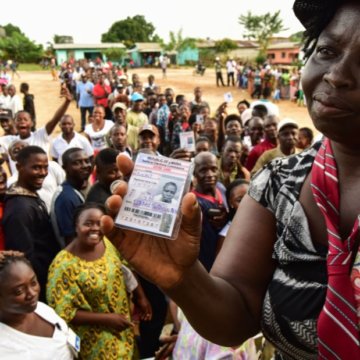- About
- Topics
- Picks
- Audio
- Story
- In-Depth
- Opinion
- News
- Donate
-
Signup for our newsletterOur Editors' Best Picks.Send
Read, Debate: Engage.

| located: | Liberia |
|---|---|
| editor: | Shira Jeczmien |
Living in countries where democracy has been the foundations of society for decades, it’s hard to fathom what it might feel like to head to the polls to vote for a president who will precede Ellen Johnson Sirleaf, Africa’s first female president and Liberia’s symbol of democracy.
Lines outside polling stations grew ceaselessly Tuesday night as the elections day came to a close. And while the freedom to vote in a country that until 11 years ago was under vicious civil wars is a cause for celebration, with over 20 candidates running for the position in office, analysts believe no one will win with a straight 50% majority vote.
“For the first time in three generations we will be transferring presidential authority democratically and peacefully from one elected leader to another” Sirleaf said the night before the election. For the first time in Liberian history, the country is also managing its own elections, without the help of the UN.
Tuesday may have been a somewhat peaceful election day, yet the candidates on choice seem to stand for a political reality vastly different from that of Sirleaf’s 12 year tenure in office, during which time she was also awarded the Nobel Peace Prize. Leading the polls are Prince Johnson, former rebel leader who played a big role in the First Liberian Civil War and is widely known for his capture, mutilation and murder of former President Samuel Doe. Another candidate running for the high seat is former international football player George Weah, who has been sitting in the Senate since 2014. But no hopeful female successor is amongst the male heavy candidate line – for the time being, Sirleaf remains the first and only president in African history.
During her time as Liberia’s President, Sirleaf stabilised a country that has otherwise suffered from tumultuous civil wars, dating back decades. Prior her democratic election in 2006, the role of the president was often chosen by either corrupt elections, or simply the murdering of one ruler by the next. Another challenge for Sirleaf during her presidency was the collapse of Liberia’s health service after the catastrophic outbreak of the West African virus of Ebola, where Liberia was among the countries worst affected between 2013 to 2016.
According to the polls, over 2 million citizens will vote for a leader who promises to stabilise Liberia’s economy and boost access to electricity; in conjunction many of the country’s women have set camps outside one of Monrovia’s busiest streets in a collective pray that this power shift brings continued peace.
What Tuesday’s elections will bring to one of the world’s poorest countries, where approximately 64% of the population live below the poverty line, is still unknown. But what is certainly needed is a leader who will preserve the immeasurable stability and rhetoric of peace brought on by a women who must never be forgotten.